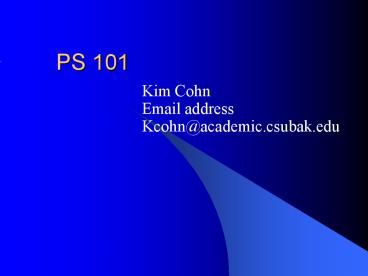PS 101
1 / 17
Title:
PS 101
Description:
Electrons exist in two forms, particles and waves at the same time. The electron wave surrounds the nucleus much as water would surround a flooded planet. ... – PowerPoint PPT presentation
Number of Views:33
Avg rating:3.0/5.0
Title: PS 101
1
PS 101
- Kim Cohn
- Email address
- Kcohn_at_academic.csubak.edu
2
How to Obtain Slides
- A CD-R disc can be checked out from the library
2 hour reserve. - The disc can be duplicated at the library.
- You can take it home and duplicate it.
- I have a few for sale.
- 5.00 need bills, not checks.
3
Elements
- Everything that you touch is called matter or
chemicals - All matter is composed of atoms
- There are about 112 different types of atoms
- Each type of atom is called an element
- Separate atoms are too small to be seen
4
Comments- Todays Demo
- The light stick in the cold water does not glow
as brightly as the light stick in the warm water.
Why not? - What would happen if I put the hot light stick in
the cold water and visa-versa?
5
Elements 2
- Atoms themselves are made up of three smaller
particles, the electron, the neutron and the
proton. - The electron is the smallest of the three, has a
charge of 1 and a relative weight of 1. - The proton and neutron have a relative weight of
about 2000 and a charge of 1 and 0 respectively.
6
Elements 3
- The proton and neuton are found at the center of
an atom or nucleus. - The nucleus is small compared to the size of the
atom. - The electrons are found outside the nucleus and
take up room, not because of their size but
because they are moving around.
7
The Electron
- A voltage (electric potential energy per charge)
placed across a sealed glass tube produces a ray,
called a cathode ray because it comes from the
cathode or negative electrode. - The ray was found to consist of a stream of small
particles with a small mass and a charge of 1. - These particles are called electrons.
8
The Nucleus
- Rutherford shot small positively charged
particles at gold foil thinking most would be
stopped. - Most of the positively charged particles went
through the foil unchanged. - This experiment showed that most of the atom is
empty. - It also showed most of the positive particles in
the atom (the protons) take up little space in
the center of the atom.
9
Protons and Neutrons
- The number of protons determine the nature of the
atom. An atom with one proton is hydrogen, two
protons helium. - The number of protons is called the atomic
number. - The neutron is also found at the center of the
atom. - The number of protons and neutron is called the
atomic mass. - Two atoms with the same number of protons but
different numbers of neutrons are called isotopes.
10
Bohrs Model
- The nucleus of an atom (the total number of
protons and neutrons at the center of an atom) is
surrounded by electrons. - The electrons circle the atom much as planets
circle the sun. - If an electron moves from an inner to an outer
orbit it will absorb energy in the form of light. - If an electron moves from an outer to an inner
orbit it will release energy in the form of
light. - The light may be visible, infrared, ultraviolet,
or even x-ray.
11
Bohrs Model in One Dimension
12
Quantum Mechanics
- Electrons exist in two forms, particles and waves
at the same time. - The electron wave surrounds the nucleus much as
water would surround a flooded planet. - The electron wave will exist only if it is a
standing or reinforced wave. - The electron can moves from an outer to an inner
wave or from one type of wave to another. - When it moves it will release or absorb energy,
just like the Bohr model.
13
Quantum Mechanics in One Dimension
14
Quantum Mechanics in One Dimension - 2
15
Quantum Mechanics in One Dimension - 3
16
Arianism
- Arius preached that the Son was not equal with
the Father but was subordinate to Him. - Declared a heresy at the Council of Nicea (325
CE). - The council was called by the Constantine.
- Constantine made Christianity the religion of the
State.
17
Questions
- What makes one element different from another?
- The atomic number of an atom that contains 32
protons, 30 neutrons and 31 electrons is? - Most of the weight of matter comes from?
- The model that explains why electrons orbit at
specific distances from the nucleus involves? - Where did the matter that you are made up of
originally come from?































